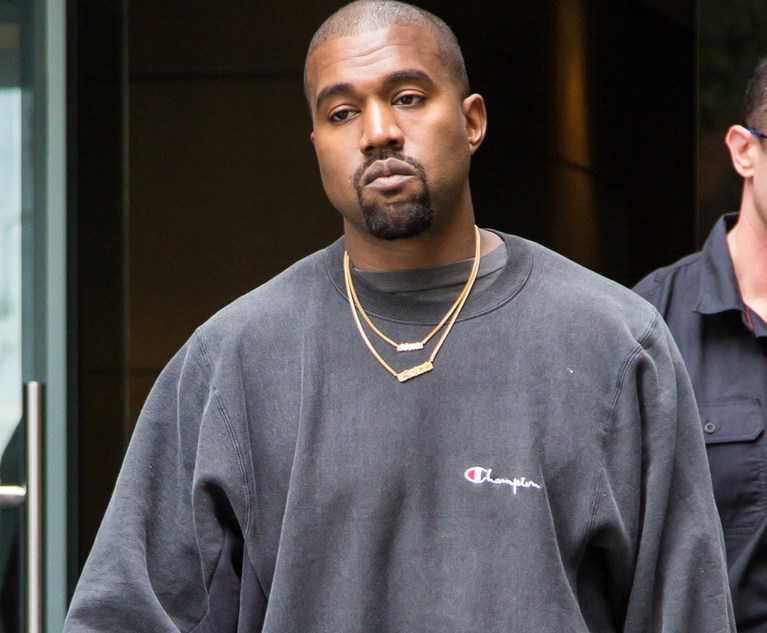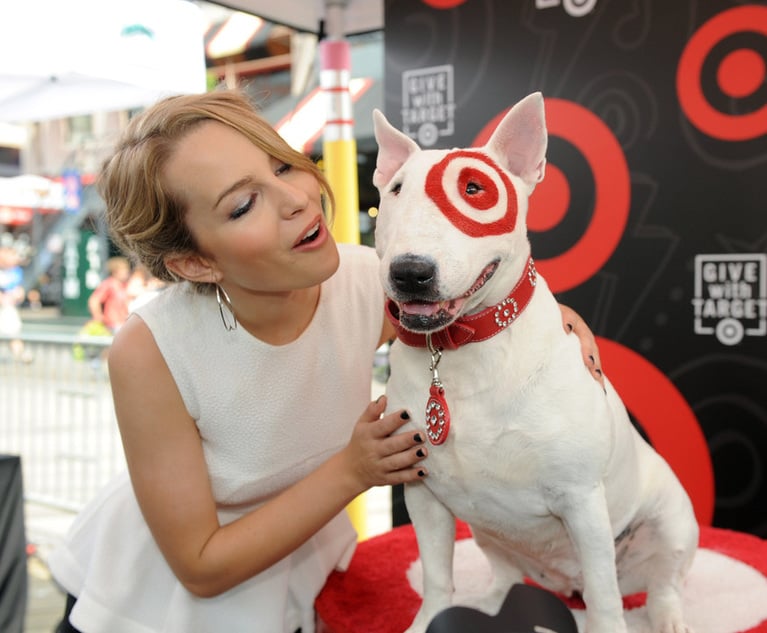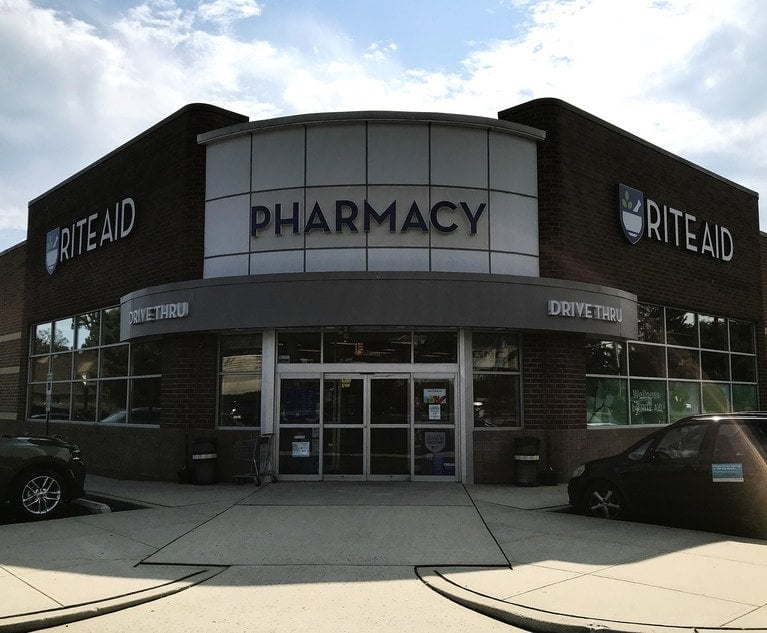 Kanye West
Kanye West Too Big to Succeed: Lessons from the Ye / Adidas Brand Partnership
The unraveling of Ye's partnerships, particularly Adidas, have attracted the attention of law practitioners and scholars, provoking questions about the transactional mechanics of the partnership agreements that follow when brands decide to collaborate with celebrities and influencers. We take a look at what brands similarly situated or who are contemplating future partnerships need to know.
December 19, 2022 at 12:31 PM
9 minute read
By now, nearly everyone is caught up on the latest drama involving Ye (formerly Kanye) West. But in case you missed it, here's the recap: Ye has been on an immoral bender that has catapulted him from grace to disgrace. Milestones on his epic downturn include showing support for white supremacy at Paris Fashion Week by sporting a "White Lives Matter" shirt, and making numerous anything-but-subtle antisemitic comments in the press and on social media. Now Ye is paying the price, literally. Many of Ye's commercial partnerships—including those with Adidas, Gap, Balenciaga, and CAA talent agency—have been terminated. The unraveling of Ye's partnerships, particularly Adidas, have attracted the attention of law practitioners and scholars, provoking questions about the transactional mechanics of the partnership agreements that follow when brands decide to collaborate with celebrities and influencers. This article will explore (1) what we know about Ye's partnership deal with Adidas, (2) how the deal's termination likely went down, and (3) key takeaways for brands similarly situated or who are contemplating future partnerships.
What exactly is a "brand partnership?" A brand partnership generally entails meaningful participation from a celebrity partner or social media influencer. For example, the celebrity partner may work with the brand's creative team to provide inspiration for, and perhaps even approval rights over, product designs. Some recent brand partnerships include Lizzo's Yitty shapewear line for Fabletics, Kim Kardashian's Beats by Fit Pro Wireless Earbuds, and Justin Bieber's "Timbiebs" limited-edition line of doughnut holes created by Bieber and Tim Hortons' in-house chef. A standard endorsement, like when Beyoncé famously starred in Pepsi's ad campaign for $50 million, differs from a brand partnership. While Lizzo used her creativity and know-how to create a new product line for Fabletics, Beyoncé simply appeared in Pepsi ads to promote their products.
This content has been archived. It is available through our partners, LexisNexis® and Bloomberg Law.
To view this content, please continue to their sites.
Not a Lexis Subscriber?
Subscribe Now
Not a Bloomberg Law Subscriber?
Subscribe Now
NOT FOR REPRINT
© 2025 ALM Global, LLC, All Rights Reserved. Request academic re-use from www.copyright.com. All other uses, submit a request to [email protected]. For more information visit Asset & Logo Licensing.
You Might Like
View All
Dog Gone It, Target: Provider of Retailer's Mascot Dog Sues Over Contract Cancellation
4 minute read
'The Unheard of Superpower': How Women's Soft Skills Can Drive Success in Negotiations


Kirkland, Rite Aid's Bankruptcy Counsel, Vilifies Drug Supplier, Says Its Walking Away Would 'Put Millions of Lives at Risk'
5 minute readLaw Firms Mentioned
Trending Stories
- 1Ex-Starbucks GC Exiting Latest Role, Will Get Severance
- 2Family Law Special Section 2025
- 3We Must Uphold the Rights of Immigrant Students
- 4Orrick Picks Up 13-Lawyer Tech, VC Group From Gunderson Dettmer
- 5How Alzheimer’s and Other Cognitive Diseases Affect Guardianship, POAs and Estate Planning
Who Got The Work
J. Brugh Lower of Gibbons has entered an appearance for industrial equipment supplier Devco Corporation in a pending trademark infringement lawsuit. The suit, accusing the defendant of selling knock-off Graco products, was filed Dec. 18 in New Jersey District Court by Rivkin Radler on behalf of Graco Inc. and Graco Minnesota. The case, assigned to U.S. District Judge Zahid N. Quraishi, is 3:24-cv-11294, Graco Inc. et al v. Devco Corporation.
Who Got The Work
Rebecca Maller-Stein and Kent A. Yalowitz of Arnold & Porter Kaye Scholer have entered their appearances for Hanaco Venture Capital and its executives, Lior Prosor and David Frankel, in a pending securities lawsuit. The action, filed on Dec. 24 in New York Southern District Court by Zell, Aron & Co. on behalf of Goldeneye Advisors, accuses the defendants of negligently and fraudulently managing the plaintiff's $1 million investment. The case, assigned to U.S. District Judge Vernon S. Broderick, is 1:24-cv-09918, Goldeneye Advisors, LLC v. Hanaco Venture Capital, Ltd. et al.
Who Got The Work
Attorneys from A&O Shearman has stepped in as defense counsel for Toronto-Dominion Bank and other defendants in a pending securities class action. The suit, filed Dec. 11 in New York Southern District Court by Bleichmar Fonti & Auld, accuses the defendants of concealing the bank's 'pervasive' deficiencies in regards to its compliance with the Bank Secrecy Act and the quality of its anti-money laundering controls. The case, assigned to U.S. District Judge Arun Subramanian, is 1:24-cv-09445, Gonzalez v. The Toronto-Dominion Bank et al.
Who Got The Work
Crown Castle International, a Pennsylvania company providing shared communications infrastructure, has turned to Luke D. Wolf of Gordon Rees Scully Mansukhani to fend off a pending breach-of-contract lawsuit. The court action, filed Nov. 25 in Michigan Eastern District Court by Hooper Hathaway PC on behalf of The Town Residences LLC, accuses Crown Castle of failing to transfer approximately $30,000 in utility payments from T-Mobile in breach of a roof-top lease and assignment agreement. The case, assigned to U.S. District Judge Susan K. Declercq, is 2:24-cv-13131, The Town Residences LLC v. T-Mobile US, Inc. et al.
Who Got The Work
Wilfred P. Coronato and Daniel M. Schwartz of McCarter & English have stepped in as defense counsel to Electrolux Home Products Inc. in a pending product liability lawsuit. The court action, filed Nov. 26 in New York Eastern District Court by Poulos Lopiccolo PC and Nagel Rice LLP on behalf of David Stern, alleges that the defendant's refrigerators’ drawers and shelving repeatedly break and fall apart within months after purchase. The case, assigned to U.S. District Judge Joan M. Azrack, is 2:24-cv-08204, Stern v. Electrolux Home Products, Inc.
Featured Firms
Law Offices of Gary Martin Hays & Associates, P.C.
(470) 294-1674
Law Offices of Mark E. Salomone
(857) 444-6468
Smith & Hassler
(713) 739-1250






